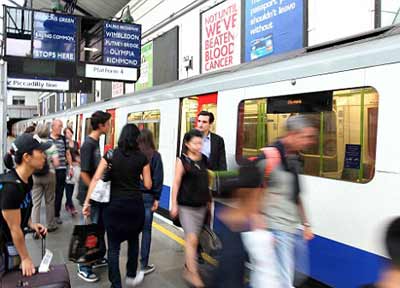|
 Workers who commute by car, bus or train to the office are more likely to suffer from stress and exhaustion, according to researchers from Lund University in Sweden. |
|
Workers who commute by car, bus or train to the office are more likely to suffer from stress and exhaustion, according to a study. Scientists assessed 12,000 employees aged between 18 and 65. They found that those who travelled to work by car or public transport reported higher levels of stress and tiredness compared to active commuters who travelled by foot or bicycle. It is now expected that the study, from Lund Unversity in Sweden, will encourage further investigation into the health impacts of commuting and the best forms of transportation. Researcher Erik Hansson said: 'Generally car and public transport users suffered more everyday stress, poorer sleep quality, exhaustion and, on a seven point scale, felt that they struggled with their health compared to the active commuters. 'The negative health of public transport users increased with journey time.' According to the Office for National Statistics, the average Briton commutes for 54 minutes every day. But now the scientists claim that the advantages of daily travel, such as higher pay or housing conditions, need to be weighed against the adverse health effects. It may also have a cost impact on industry. According to a CBI and Pfizer Absence and Workplace Health Survey, the UK economy lost 190million working days to absence last year, with each employee taking an average of 6.5 days off sick, costing employers £17billion. However researchers highlight that the findings, published in the journal BMC Public Health, do not prove that commuting causes ill health and further research is needed. Income, family background and environmental factors are other variables that need to be considered. Hansson added that the findings would help to 'readdress the balance between economic needs, health, and the costs of working days lost'. (Read by Emily Cheng. Emily Cheng is a journalist at the China Daily Website.) (Agencies) |
研究表明,乘汽車、公交車或列車上下班的人更容易感到壓力大和精疲力竭。 科學(xué)家評(píng)估了1.2萬(wàn)名年齡在18歲到65歲之間的員工的狀況。 結(jié)果發(fā)現(xiàn),那些乘汽車或公共交通工具上下班的人相比那些采用步行或騎車這種動(dòng)態(tài)出行方式的上班族壓力更大、更疲勞。 據(jù)稱,瑞典隆德大學(xué)的這一研究預(yù)計(jì)將促使人們進(jìn)一步去調(diào)查通勤對(duì)健康的影響,以及最佳的出行方式。 研究人員埃里克?漢森說(shuō):“一般來(lái)說(shuō),乘汽車和公共交通工具上下班的人每天要承受更多壓力,睡眠質(zhì)量更差,感覺(jué)更疲勞。而且,根據(jù)他們?cè)谧罡叻譃?分的健康評(píng)估表上的打分情況,和動(dòng)態(tài)出行方式的上班族相比,他們覺(jué)得自己健康狀況更差。” “乘坐公共交通工具上下班的人的健康狀況隨著乘車時(shí)間的增長(zhǎng)而下降。” 根據(jù)英國(guó)國(guó)家統(tǒng)計(jì)局的數(shù)據(jù),英國(guó)人平均每天花在上下班路上的時(shí)間為54分鐘。 不過(guò)現(xiàn)在科學(xué)家指出,每天乘車相伴而來(lái)的好處,例如更高的薪水或更好的住房條件,需要與乘車對(duì)健康的不利影響進(jìn)行權(quán)衡。 乘車上下班可能還會(huì)影響企業(yè)的成本。 根據(jù)英國(guó)工業(yè)聯(lián)盟和輝瑞制藥公司聯(lián)合進(jìn)行的“缺席和工作場(chǎng)所健康調(diào)查”,英國(guó)經(jīng)濟(jì)去年因員工缺勤損失了1.9億工作日,平均每個(gè)員工休病假6.5天,導(dǎo)致雇主損失170億英鎊。 但是,研究人員強(qiáng)調(diào)說(shuō),這一研究并未證實(shí)乘車上下班會(huì)導(dǎo)致健康惡化,這方面還有待進(jìn)一步研究。該研究發(fā)表在期刊《英國(guó)醫(yī)學(xué)委員會(huì)公共健康》上。 收入、家庭背景和環(huán)境因素是其他需要考慮在內(nèi)的變數(shù)。 漢森補(bǔ)充說(shuō),這些研究發(fā)現(xiàn)將有助于“重新平衡經(jīng)濟(jì)需要、健康和損失的工作日成本之間的關(guān)系。” 相關(guān)閱讀 全球通勤痛苦指數(shù)大調(diào)查 深圳北京名列前茅 日本:十大不當(dāng)乘車行為 大聲說(shuō)話居首 (中國(guó)日?qǐng)?bào)網(wǎng)英語(yǔ)點(diǎn)津 陳丹妮 編輯:Julie) |
|
Vocabulary: weighed against: 與……進(jìn)行權(quán)衡 highlight: 強(qiáng)調(diào) variable: 變數(shù);可變因素,變動(dòng)因素 readdress: 使重新著手 |
